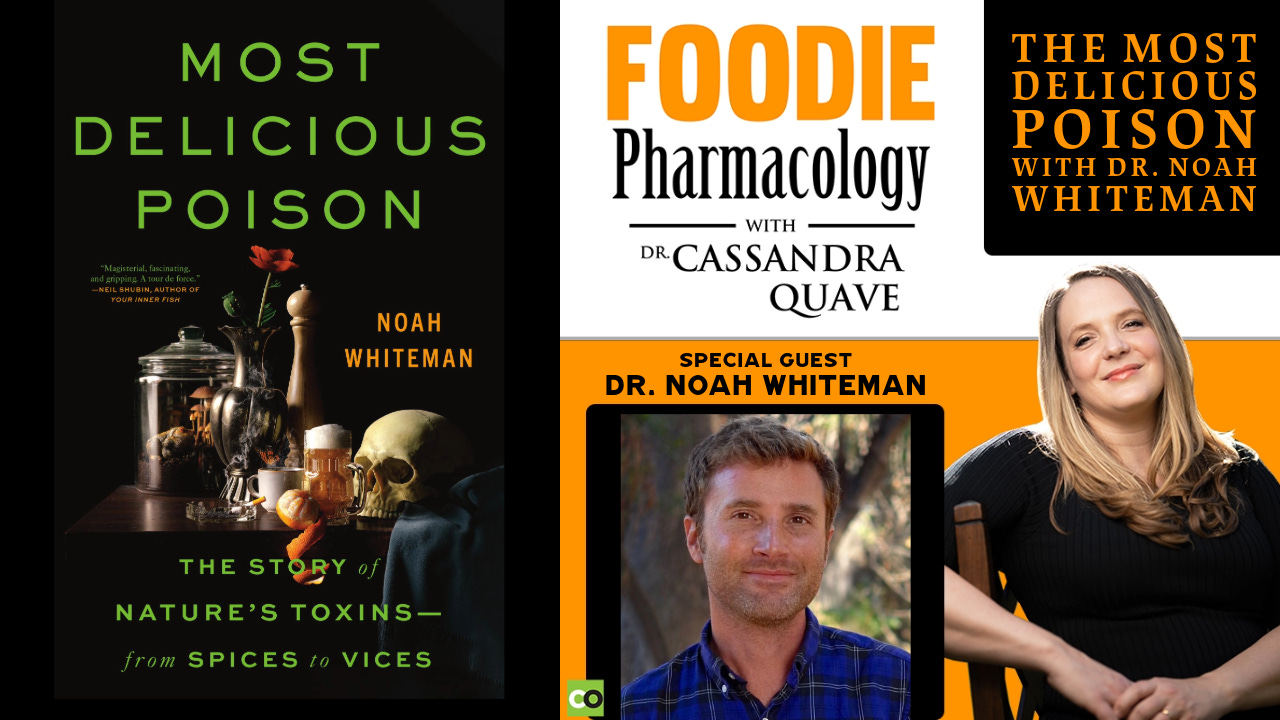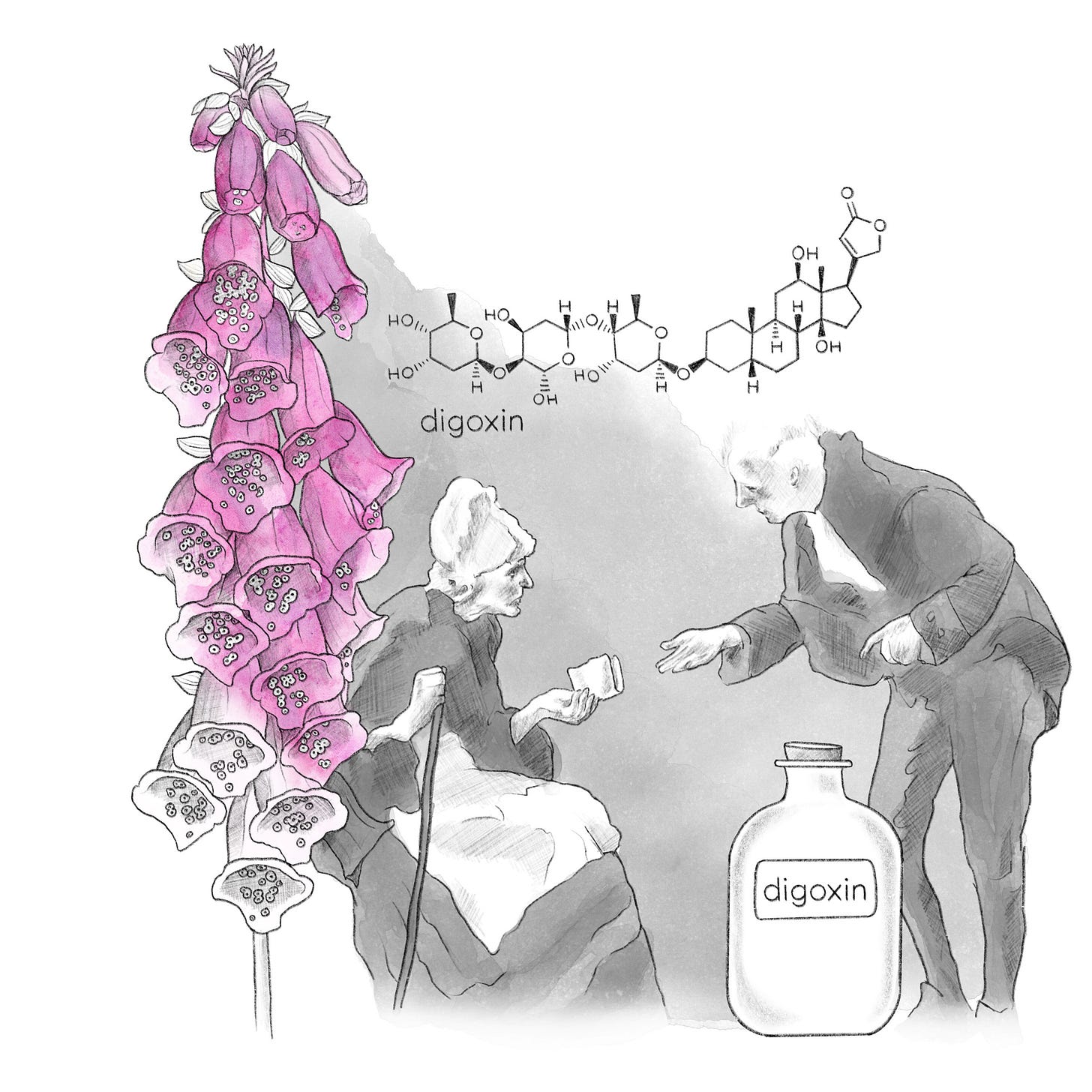🎧 The Most Delicious Poison with Dr. Noah Whiteman
Join Dr. Quave and Dr. Whiteman as they examine the fascinating evolutionary history of nature's poisons in our foods and medicine.
Did you know that some everyday foods contain natural toxins that have been developing for millions of years? This week, Dr. Quave talks with Dr. Noah Whiteman, an Evolutionary Biology professor from UC Berkeley and the author of the book “The Most Delicious Poison.” They explore how certain poisons in nature work, how they affect us, and their role in the bigger picture of evolution. They cover a wide range of fascinating subjects, like why your coffee has caffeine, how certain caterpillars can handle toxic substances in plants, what risks are associated with the chemicals in vaping products, and even why the world's largest flowers have such a strong smell. Tune in to learn about an exciting mix of topics from nature, science, medicine, and history!
Learn more about Dr. Whiteman’s book at www.mostdeliciouspoison.com and research at www.whitemanlab.org. You can follow him on social media [@]NKWhiteman on X (formerly Twitter), Instagram, Bluesky, Threads and Mastadon.
Access a summary of this Foodie Pharmacology episode at the bottom of this post. This special feature is available to paid subscribers of the Nature’s Pharmacy newsletter.
About Noah
An uncle, husband, naturalist, and award-winning professor, Noah Whiteman was raised in northeastern Minnesota, first at the edge of Lake Superior in Duluth along southern reaches of the boreal forest and then deep in the Sax-Zim Bog.
Most Delicious Poison is Whiteman's first book and the hardcover was published in North America on October 24, 2023 by Little, Brown Spark.
Noah Whiteman is Professor of Evolutionary Biology in the Department of Integrative Biology and Department of Molecular and Cell Biology at the University of California, Berkeley where he runs a basic research laboratory that studies plant-animal coevolution. At Berkeley, he is also affiliated with the Helen Wills Neuroscience Institute, Center for Computational Biology, Museum of Vertebrate Zoology, and Jepson and University Herbaria, and is Director of the Essig Museum of Entomology. Prior to joining the Berkeley faculty in 2016, he was Assistant and Association Professor in the Department of Ecology and Evolutionary Biology at the University of Arizona.
In 2020, Whiteman received a Guggenheim Fellowship to write Most Delicious Poison and in the same year was elected to the Royal Entomological Society, the California Academy of Sciences, and the Board of Directors of the Genetics Society of America.
He received a B.A. cum laude and with Distinction from Saint John's University in Collegeville, Minnesota in 1998. In the summers during college he worked as a naturalist guide at Gunflint Lodge on the Minnesota-Ontario border and for a northern tallgrass prairie restoration project in Collegeville. He then received his M.S. in aquatic entomology from the University of Missouri-Columbia in 2000. For his doctoral research in tropical biology, he studied coevolution between the native birds of the Galápagos Islands and their parasites with Patty Parker, and was awarded his Ph.D. in 2006. He was Head Teaching Fellow for Animal Behavior at Harvard University in 2006 where he won the Distinguished Teaching Award. From 2007-2010 he completed a joint postdoctoral research fellowship in genetics, genomics and molecular biology at Harvard University's Museum of Comparative Zoology with Professor Naomi Pierce and at Massachusetts General Hospital and Harvard Medical School with Professor Fred Ausubel.

Whiteman has been featured on NPR's Morning Edition and PBS's Genius by Stephen Hawking and his pathbreaking research has been featured in the New York Times, Der Spiegel, Scientific American, and Popular Science. He lives in Oakland, California with his husband.
Listen to the interview
Listen to the podcast on any of your favorite podcast streaming services. Subscribe to Foodie Pharmacology to access new episodes weekly! If you enjoy this and other episodes, let me know! Give is a 5-star rating on Apple Podcasts so others can find it and enjoy!
Watch the video
Available exclusively on the Teach Ethnobotany YouTube Channel, you can catch the full video version of this episode and others! Enjoy!
Yours in health, Dr. Quave
Here is the episode summary, available to Nature’s Pharmacy paid subscribers:
Introduction
Dr. Noah Whiteman, a professor of evolutionary biology at University of California, Berkeley, recently joined Dr. Cassandra Quave on her podcast, Foodie Pharmacology, to discuss his new book, "Most Delicious Poison: The Story of Nature's Toxins from Spices to Vices."
The Co-evolutionary Dance between Plants and Animals
Dr. Whiteman and Dr. Quave kicked off their discussion by exploring the unique relationship that exists between plants and animals. They examined the world of plant chemistry, discussing how plants produce certain compounds not for the benefit of humans or animals, but predominantly for their own evolutionary advantage.
Plants and animals have been finessing an intriguing power dynamic since primordial times, and poison is their invisible battlefield. Nature's toxins aren't there by accident. They are defensive elements that protect plants from insects and other predators. But as Whiteman and Quave uncover, these biological chemical weapons often come with a double edge.
The Two Sides of Nature's Toxins
Nature's toxins can be both lethal and useful. Despite being poisonous, these chemical compounds can exude certain benefits if consumed within safe thresholds.
Dr. Whiteman brought up the story of cardiac glycosides as an example. These chemicals found in the milk of milkweed plants serve as a protective shield, deterring insects and other potential predators. Remarkably, though, these very cardiac glycosides that are poisonous to insects are still prescribed in certain heart medications today. They are potent but, when used carefully and within safe limits, they can save lives.
The Intersection of Plant Chemistry and Human Survival
Next, they discussed how humans have developed a rather paradoxical relationship with some of nature's toxins. Despite the obvious risks, humanity has learned to harness the power of certain plant chemicals, often in the form of spices, intoxicants, and medicines. Dr. Whiteman lays out the intricate relationships between humans, animals, and the chemical compounds in plants, etching a compelling narrative of survival, adaptation, temptation, and restraint.
The Appeal and Peril of Nature's Chemicals
Dr. Quave and Dr. Whiteman clear the air around the misconceptions clouding natural substances. They challenge the widespread belief that because something is natural, it’s inherently safe and beneficial for humans, which is far from the truth. Uncontrolled consumption of natural substances like caffeine or nicotine, for example, can pose serious health risks. Life finds a way to protect itself, and nature uses chemistry to do so. For us as humans, it is a never-ending quest to discern the intricate line between poison and panacea.
Discovering the Mysterious World of Nature's Toxins
In the realm of nature, the line distinguishing poison from potion is a populated battlefield of piquant spices, potent vices, and countless survival stories. Understanding nature's toxins is not only about understanding the co-evolutionary war between plants and predators, but it's also about recognizing our role in this endless dance of survival and the bearing it has on our health, culture, and future.








I especially liked the part about the way we brew our coffee makes a difference regarding ldl cholesterol, I cold brew organic light roast and I'm curious if I need to change?
So excited that you had the interview with him. When I read the book all I could think about were the two of you in conversation...